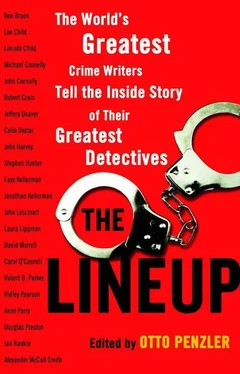Otto Penzler - The Lineup - The World's Greatest Crime Writers Tell the Inside Story of Their Greatest Detectives
Здесь есть возможность читать онлайн «Otto Penzler - The Lineup - The World's Greatest Crime Writers Tell the Inside Story of Their Greatest Detectives» весь текст электронной книги совершенно бесплатно (целиком полную версию без сокращений). В некоторых случаях можно слушать аудио, скачать через торрент в формате fb2 и присутствует краткое содержание. Жанр: Прочая документальная литература, на английском языке. Описание произведения, (предисловие) а так же отзывы посетителей доступны на портале библиотеки ЛибКат.
- Название:The Lineup: The World's Greatest Crime Writers Tell the Inside Story of Their Greatest Detectives
- Автор:
- Жанр:
- Год:неизвестен
- ISBN:нет данных
- Рейтинг книги:4 / 5. Голосов: 1
-
Избранное:Добавить в избранное
- Отзывы:
-
Ваша оценка:
- 80
- 1
- 2
- 3
- 4
- 5
The Lineup: The World's Greatest Crime Writers Tell the Inside Story of Their Greatest Detectives: краткое содержание, описание и аннотация
Предлагаем к чтению аннотацию, описание, краткое содержание или предисловие (зависит от того, что написал сам автор книги «The Lineup: The World's Greatest Crime Writers Tell the Inside Story of Their Greatest Detectives»). Если вы не нашли необходимую информацию о книге — напишите в комментариях, мы постараемся отыскать её.
The most venerated and bestselling authors in the mystery world reveal how they created their most beloved serial characters.
The Lineup: The World's Greatest Crime Writers Tell the Inside Story of Their Greatest Detectives — читать онлайн бесплатно полную книгу (весь текст) целиком
Ниже представлен текст книги, разбитый по страницам. Система сохранения места последней прочитанной страницы, позволяет с удобством читать онлайн бесплатно книгу «The Lineup: The World's Greatest Crime Writers Tell the Inside Story of Their Greatest Detectives», без необходимости каждый раз заново искать на чём Вы остановились. Поставьте закладку, и сможете в любой момент перейти на страницу, на которой закончили чтение.
Интервал:
Закладка:
I remember the woman greeting us at her gate. She was wearing a red dress and had the naturally courteous manner one finds so often in that country. Walking about in the yard, blissfully unaware of the fate that awaited it, was a chicken.
After a few niceties had been exchanged, the woman started to pursue the chicken, which ran here and there, squawking in alarm but unable to escape. Once she had caught it, she dispatched it with a flick of the wrist and handed it to Fiona. I remember thinking: What a remarkable woman. And then I thought: I wonder what her history is? And finally I thought: One day perhaps I should write a story about a woman like this who lives in this village.
That was the beginning of the story of Mma Ramotswe.
6
The following year I went to work in Botswana for a period of about eight months, having been allowed to do so by the University of Edinburgh, where I lectured. The University of Botswana had requested that I be seconded to them to set up their law program. I was happy to do this, as I had very much enjoyed my time in Gaborone the previous year and I rather liked the idea of spending more time there.
I went out and was allocated a house behind a garage, not far from the Tlokweng Road. The garden was bare, but I was approached by a young man who wanted me to take him on as my gardener. In Botswana, as in other countries in the region, it is very much expected that one will contribute to the local economy by employing staff one does not really need. In Swaziland I had given a job to a young man called Simon who spent most of his time tending to the strawberries that were already growing in the garden. Then he ate most of the strawberries himself. It was a satisfactory arrangement-from his point of view, at least.
Now I employed a man called Felix, who unfortunately revealed on the first day he worked for me that he had a very severe cough. I became suspicious and took him up to Mochudi to be seen by Howard, who confirmed that Felix was unfortunately suffering from tuberculosis. Howard admitted him to the hospital and cured him within three months or so. Felix returned to work; in many other countries in Africa, where health budgets are much more pinched, the outcome might have been different.
One day Felix came to me and complained that somebody had whipped him very badly. He took off his shirt, and I saw the skin covered with weals. I asked him who had done this, and he replied that it had been the supervisor at a local mission. I drove with Felix to make a complaint to the missionary, who interrogated the supervisor. The supervisor agreed that somebody had whipped Felix, but said that this was because Felix had gone round the mission station biting his enemies.
There was not much I could do, but I was reminded of a lesson that I was subsequently to make use of in the Mma Ramotswe books: Informal solutions are very common in African countries, and one has to be careful about interfering if one is an outsider. Mind you, I do not know quite what Mma Ramotswe would have done in this difficult situation.
7
I returned to Scotland. Each year, though, I would go back to Botswana, where I was still involved in a number of projects, including writing a book on the criminal law of the country. I imagined that one day I might write something about Gaborone and the people I had met there, but I did nothing about it. I had other things to work on and was kept fairly busy with them. But in 1996, I sat down one day and wrote a short story about a woman called Precious Ramotswe who uses the inheritance she received from her father to start a little business-a private-detective agency. All the odds are against her, but she succeeds.
I wrote the short story in the space of an hour or so. I do not remember the circumstances in which I wrote it; most of us, I suspect, do not know at the time that some apparently insignificant act will change our lives. Perhaps there are some authors who, when they put pen to paper, say to themselves: Now, this is something that is going to change everything for me. I have never done that, even if I occasionally remember where I was and what I was doing when an idea came to me.
I do remember, however, where I was when I wrote most of the novel that followed. My wife and I had arranged a house exchange with a couple from a small village outside Montpelier in the south of France. The house we were in had a study on a mezzanine floor, and it was here that I sat as I wrote The No. 1 Ladies’ Detective Agency. I wrote in the early morning, and then at lunchtime we would drive off to a picnic place near a river to take the children swimming. I remember finishing the book, but I do not remember thinking that it would be likely to have much of a life beyond an initial small print run.
I gave the book to the publishers who had brought out my previous collection of short stories, Heavenly Date. Stephanie Wolfe Murray, who then ran the firm, read the manuscript while she accompanied a truckload of relief supplies to the Balkans. She said that the book would be published, and I waited to hear more. Then the publishing firm ran into difficulties and was bought by somebody else. Stephanie, one of Scotland ’s great publishers of the twentieth century, was no longer in charge. I suspect that I was too non-hip for the new owners and so, realizing that my face did not fit, I took the manuscript to another publisher. This firm, Polygon, was then owned by Edinburgh University Press, and the commissioning editor was Marion Sinclair (God bless her). She and Alison Bowden (God bless her too) saw the book through to publication in 1998. I will remain forever in their debt.
They printed fifteen hundred copies. At the time of publication I was spending six months as a visiting professor at Southern Methodist University in Dallas, Texas, a private university in a plush part of that remarkable and most unusual city. I was happy there, although I found that Dallas was a city that required a bit of work to get to know. I made friends amongst my new colleagues at SMU and began to study the saxophone under an African American instrument repairer and jazz player who took me to blues clubs in Dallas that I would never have been able to find had it not been for him.
Another set of very good friends in Dallas were Joe and Mimi McKnight. Joe, who is a well-known Texas legal historian, was a Rhodes Scholar and is a great devotee of Oxford, where he and Mimi spend part of each summer. Mimi is a bibliophile, an authority on the ways of cats, and sings in the choir of a high Episcopal church in Highland Park. They held a launch party for the book in their house in Dallas. My friends from SMU generously came to this party, but nobody, including me, thought that this book would go anywhere in particular. Who would be interested in reading about the life of a woman in Botswana, a country that relatively few people then knew anything about?
8
The book was published in Scotland and was given a very encouraging review in the Daily Telegraph by Tony Daniels, who is an accomplished essayist and the author of a number of highly entertaining and thought-provoking books. Rather to my surprise, the first print run sold out and additional copies were printed.
I wrote a sequel to the first book, and another book after that. After their publication in Scotland, these books were offered to large London paperback publishers but were consistently turned down. My agents pointed to the generous reviews, but this would not sway those publishers. Why? The impression I had was that they wanted edge; they expected violence and dysfunction, especially from a Scottish writer. We were all meant to be gritty and in-your-face.
In the United States the books were initially distributed by Columbia University Press. They sold them into a number of independent bookstores, where they slowly started to get a word-of-mouth following. Eventually there were four in the series, and that was the stage at which the series was picked up by large publishers in New York, Anchor Books and Pantheon. Suddenly it became very successful. Foreign editions were sold, and today the books are published in some forty-five languages. Mma Ramotswe had arrived.
Читать дальшеИнтервал:
Закладка:
Похожие книги на «The Lineup: The World's Greatest Crime Writers Tell the Inside Story of Their Greatest Detectives»
Представляем Вашему вниманию похожие книги на «The Lineup: The World's Greatest Crime Writers Tell the Inside Story of Their Greatest Detectives» списком для выбора. Мы отобрали схожую по названию и смыслу литературу в надежде предоставить читателям больше вариантов отыскать новые, интересные, ещё непрочитанные произведения.
Обсуждение, отзывы о книге «The Lineup: The World's Greatest Crime Writers Tell the Inside Story of Their Greatest Detectives» и просто собственные мнения читателей. Оставьте ваши комментарии, напишите, что Вы думаете о произведении, его смысле или главных героях. Укажите что конкретно понравилось, а что нет, и почему Вы так считаете.












